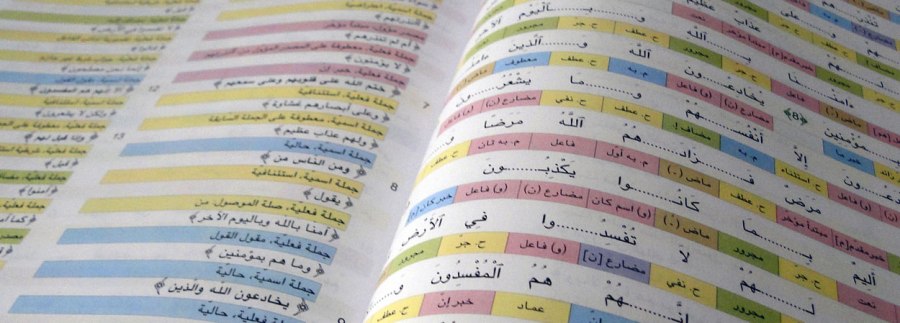The following is the first chapter of a translation taken from Qārī Siddīq Bāndwī’s Tashīl al-Naḥw that I was involved in through some editing and translating along with two former students. The project was put on hold in an attempt to first complete another work that was near the final draft stage. I have produced the draft here for general benefit.
Chapter 1
NAḤW
Naḥw (syntax) is a branch of Arabic grammar that studies how sentences are formulated through the combination of nouns (ism), verbs (fiʿl), and particles (ḥarf) and how such formulations determine the state of the end of words in the sentence.
In the science of naḥw, both the individual word كَلِمَةٌ (kalimah) and the combination of words كَلَامٌ (kalām) are studied. The benefit of studying the science is that it protects the one who learns and observes its rules from making grammatical mistakes in their speech and composition.
UTTERANCE (Lafẓ)
In Arabic, any sound that is uttered from the mouth is called a lafẓ لَفْظٌ. Utterances fall into two categories:
- Mawḍūʿ مَوْضُوْعٌ (coined): A meaningful utterance. For example: مَاءٌ, which means water, and خُبْزٌ which means bread.
- Muhmal مُهمَلٌ (uncoined): A non-meaningful utterance. For example: in Arabic, when the letters of the word Zaid زَيْدٌ are reversed, making it daiz دَيْزٌ, which has no meaning. Similarly, the meaningless utterances of an infant are considered muhmal, as such sounds carry no specific meaning.
Meaningful Utterance (MAWḌŪʿ)
Mawḍūʿ utterances further fall into two categories:
- Mufrad مُفْرَدٌ (single words)
- Murakkab مُرَكَّبٌ (compound words/phrases)
Mufrad مُفْرَدٌ words convey a single meaning, such as قَلَمٌ (pen) or كِتَابٌ (book). Another name for the mufrad utterance is kalimah كَلِمَةٌ (a single word). The kalimah كَلِمَةٌ can be divided into three types:
- Ism اِسْمٌ (noun)
- Fiʿl فِعْلٌ (verb)
- Ḥarf حَرْفٌ (particle)
NOUN (ISM)
Ism اِسْمٌ: a word independent of tense that conveys meaning independent of other words.
For example: ضَارِبٌ (hitter), عِلْمٌ (knowledge), دِرْهَم ٌ (dirham).
Isms are of three types:
i. Jāmid جَامِدٌ (frozen noun): A noun that is neither derived from another word nor used to derive another. For example: رَجُلٌ (man), فَرَسٌ (horse), حِمَارٌ (donkey), جَعْفَرٌ (a small river), سَفَرْجَلٌ (quince).
ii. Maṣdar مَصْدَرٌ (infinitive noun): A noun that is not derived from another word, rather other words are derived from it. For example: نَصْرٌ (assistance), ضَرْبٌ (strike), عِلْمٌ (knowledge). The maṣdar is used to form the مَاضِي (past tense), مُضَارِعٌ (present tense), اَمْرٌ (imperative), نَهْيٌ (prohibitive), اِسْمُ فَاعِلٍ (subject), etc…
iii. Mushtaqq مُشْتَقٌ (derivative noun): A noun that is derived from a maṣdar. For example: the words نَاصِرٌ،(the one who helps) مَنْصُوْرٌ (the one who is helped) are derivatives of the masdar نَصْرٌ.
VERB (FIʿL)
Fiʿl فِعْلٌ (verb): a word whose meaning can be understood independent of other words but is restricted to a tense, either past, present, or future.
For example, نَصَرَ (he helped), يَنْصُرُ (he is helping/will help), فَتَحَ (he opened), يَفْتَحُ (he opens/will open).
PARTICLE (ḤARF)
Ḥarf حَرْفٌ (particle): a word whose meaning cannot be understood independent of other words. For example: مِنْ (from), فِيْ (in). Particles cannot be understood unless they are used with a noun.
For example, زَيْدٌ خَرَجَ مِنَ الدَّارِ وَدَخَلَ فِي الْمَسْجِدِ (Zayd exited the house and entered the masjid). In this example, the meanings of the words مِنْ and فِيْ would not have been understood without the usage of دَارٌ and مَسْجِدٌ respectively.
QUESTIONS
1. State the definition, subject-matter, and benefit of naḥw.
2. Define mawḍūʿ and muhmal and provide examples of each.
3. What is another name for mufrad?
4. State the three types of kalimah and provide an example of each.
5. Define the three types of ism and provide an example of each.
6. State whether the following words are ism, fiʿl, ḥarf, jāmid, or mushtaqq: رَجُلٌ، اِمْرَءَةٌ، ضَرَبَ، يَطْلُبُ، نَاصِرٌ، خَرَجَ، حَتّى، اِلٰى.

Assalamualaikum. What is the book pictured in the post?
Just a random picture pulled from the net
Assalamualaukim, ustadh. What is the book pictured in this post?
Assalamu’Alaikum respected Hazrat,
I hope Allah has placed you in the best of health.
I have been trying to learn Arabic for some time now. What would your recommendation be for a curriculum and Tarteeb for studying this noble science?
I am interested in hearing your comments regarding: Classical Arabic, MSA Arabic, colloquial Arabic, Written Arabic vs. Spoken Arabic, etc., how important each is, and how to study each part.
JazakumullahuKhairan Shaikh; Your detailed response (whatever you have time for) would be greatly appreciated.
Al-salam ‘alaykum,
One of the important questions I would want to ask you first would be what your purpose of learning the language is. Depending on one’s objective, the approach will differ.
Bilal Ali
Jazakallahu-khaira Hazrat for the timely reply.
My immediate interest would be to study the Quran and other Islamic works written in Arabic by the classical scholars. However, my intention is that after that I could also go forward and continue to build proficiency in conversation and understanding of Arabic presently used in Arab countries.
As salam alaikum shaikh
From where i can get that book which is posted
بارك الله